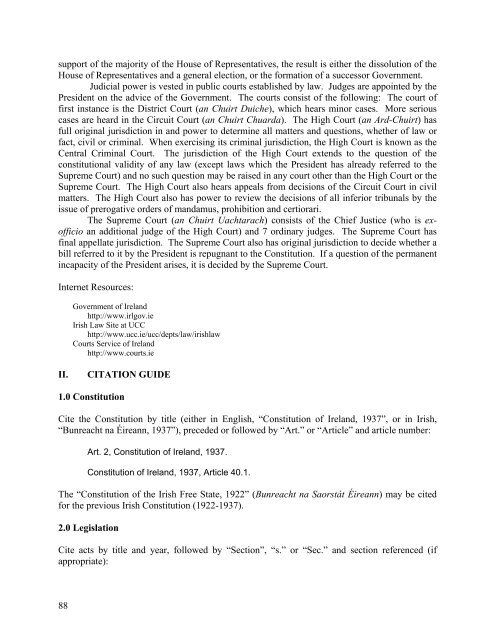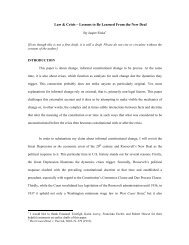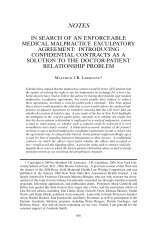Guide to Foreign and International Legal Citations - New York ...
Guide to Foreign and International Legal Citations - New York ...
Guide to Foreign and International Legal Citations - New York ...
You also want an ePaper? Increase the reach of your titles
YUMPU automatically turns print PDFs into web optimized ePapers that Google loves.
support of the majority of the House of Representatives, the result is either the dissolution of the<br />
House of Representatives <strong>and</strong> a general election, or the formation of a successor Government.<br />
Judicial power is vested in public courts established by law. Judges are appointed by the<br />
President on the advice of the Government. The courts consist of the following: The court of<br />
first instance is the District Court (an Chuirt Duiche), which hears minor cases. More serious<br />
cases are heard in the Circuit Court (an Chuirt Chuarda). The High Court (an Ard-Chuirt) has<br />
full original jurisdiction in <strong>and</strong> power <strong>to</strong> determine all matters <strong>and</strong> questions, whether of law or<br />
fact, civil or criminal. When exercising its criminal jurisdiction, the High Court is known as the<br />
Central Criminal Court. The jurisdiction of the High Court extends <strong>to</strong> the question of the<br />
constitutional validity of any law (except laws which the President has already referred <strong>to</strong> the<br />
Supreme Court) <strong>and</strong> no such question may be raised in any court other than the High Court or the<br />
Supreme Court. The High Court also hears appeals from decisions of the Circuit Court in civil<br />
matters. The High Court also has power <strong>to</strong> review the decisions of all inferior tribunals by the<br />
issue of prerogative orders of m<strong>and</strong>amus, prohibition <strong>and</strong> certiorari.<br />
The Supreme Court (an Chuirt Uachtarach) consists of the Chief Justice (who is exofficio<br />
an additional judge of the High Court) <strong>and</strong> 7 ordinary judges. The Supreme Court has<br />
final appellate jurisdiction. The Supreme Court also has original jurisdiction <strong>to</strong> decide whether a<br />
bill referred <strong>to</strong> it by the President is repugnant <strong>to</strong> the Constitution. If a question of the permanent<br />
incapacity of the President arises, it is decided by the Supreme Court.<br />
Internet Resources:<br />
88<br />
Government of Irel<strong>and</strong><br />
http://www.irlgov.ie<br />
Irish Law Site at UCC<br />
http://www.ucc.ie/ucc/depts/law/irishlaw<br />
Courts Service of Irel<strong>and</strong><br />
http://www.courts.ie<br />
II. CITATION GUIDE<br />
1.0 Constitution<br />
Cite the Constitution by title (either in English, “Constitution of Irel<strong>and</strong>, 1937”, or in Irish,<br />
“Bunreacht na Éireann, 1937”), preceded or followed by “Art.” or “Article” <strong>and</strong> article number:<br />
Art. 2, Constitution of Irel<strong>and</strong>, 1937.<br />
Constitution of Irel<strong>and</strong>, 1937, Article 40.1.<br />
The “Constitution of the Irish Free State, 1922” (Bunreacht na Saorstát Éireann) may be cited<br />
for the previous Irish Constitution (1922-1937).<br />
2.0 Legislation<br />
Cite acts by title <strong>and</strong> year, followed by “Section”, “s.” or “Sec.” <strong>and</strong> section referenced (if<br />
appropriate):
















